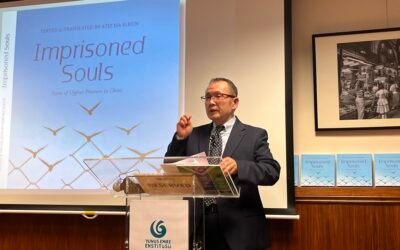A forum was held in Shanghai, a city that was really the cradle of the Buddhist current—which was, however, never Marxist, and later developed mostly in Taiwan.
by Zhu Yaozu

On September 21 and 22, 2024, the Jade Buddha Temple in Shanghai hosted a national forum on “the theory and practice of humanistic Buddhism.” Bureaucrats from the United Front Work Department and the government-controlled China Buddhist Association spoke at the event.
Venerable Changzang, speaking also on behalf of the absent Master Yanjue, the President of the government-controlled China Buddhist Association of which Changzang is Vice President, hailed Shanghai as “the birthplace of humanistic Buddhism.” He also explained that “humanistic Buddhism” and “Sinicized Buddhism” are one and the same.
“Humanistic Buddhism,” he said, always meant a Buddhism adapted to the most progressive ideologies of the time. Today the most advanced ideology is the CCP’s Marxism with Chinese characteristics as presented by Xi Jinping. It is to Xi Jinping Thought that a Buddhism that is both Sinicized and humanist should adapt, Changzang said.

That Shanghai is the birthplace of humanistic Buddhism is not false as it is there that Master Taixu, one and perhaps “the” key figure in the development of the current, taught in the last period of his life. Taixu died at the Jade Buddha Temple in 1947.
As one participant to the forum told “Bitter Winter,” mentioning the important role of Taixu was the only true statement in Changzang’s speech and indeed in the whole forum. All the rest was false.
Taixu did not want to adapt Buddhism to modern anti-religious ideologies. What he proposed was a Buddhism that was less focused on ritual and more on helping suffering human beings, including through active social and charitable work. This was the real humanistic Buddhism, and it was impossible to practice it under the iron-clad dictatorship of the Chinese Communist Party.

In fact, those loyal to Taixu’s teachings largely went to Taiwan, where worthy “humanistic” institutions such as Tzu Chi, Fo Guang Shan, and the Dharma Drum Mountain were developed. Some of these institutions may maintain certain “political” relationships with present-day China for their own purposes but certainly their ideas and actions are not inspired by Marxism or Xi Jinping socialism. As “Bitter Winter” has already denounced, the CCP is simply trying to hijack the prestigious label “humanistic Buddhism,” make it a synonym of “Sinicized Buddhism,” empty the name of its original content, and replace it with Xi Jinping’s brand of Marxism. It is, basically, a fraud, perpetrated with the complicity of the China Buddhist Association.

Uses a pseudonym for security reasons.



